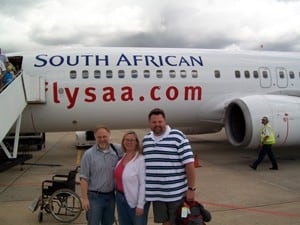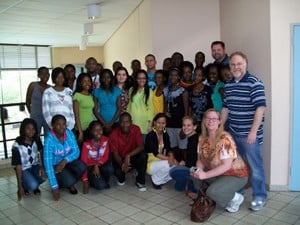UAMS Helping Establish Lab Sciences Program in Namibia
May 4, 2010 | In one of the most rural African countries, some UAMS faculty members are reaching out to help a university there educate more health care professionals. Don Simpson, Ph.D., M.P.H., chairman of the Department of Laboratory Sciences in the UAMS College of Health Related Professions (CHRP), has been working since 2007 through a four-year, $640,000 grant from the American International Health Alliance (AIHA) to partner with the Polytechnic of Namibia and establish that country’s (and Africa’s) first Bachelor of Science in biomedical sciences program. In July, students in the program’s first class will begin the clinical internships that are the focus of their final year. Simpson said he is seeking funds that would help construct a building for the laboratory sciences program with classrooms and teaching labs. The building also could be used to host more allied health programs, he said. The country, with a population of just more than 2 million – compared to Arkansas’ population of about 2.8 million, has fewer than 180 medical technologists and cytotechnologists, Simpson said. Many of these technologists are approaching retirement age while others leave the country for education and never return. So it was important to establish a program to produce their own laboratory scientists, who would conduct diagnostic tests on tissue and fluid samples in hospitals, clinics and other labs. There are now 88 students in the laboratory sciences program. The program has grown from one faculty member to seven full-time faculty members and a host of guest lecturers, he said. “I think the students there have an understanding about how important the profession is and how important they can be for the state of health care in their country,” Simpson said. “It’s really fulfilling to have an opportunity to go share the knowledge and experience from our program in such a positive way that will really boost health care in their country. “It also offers a new perspective on what we are doing while helping others and seeing ways that we can improve our own program.” Simpson credited Charles Cranford, D.D.S., former vice chancellor over the UAMS Area Health Education Center (AHEC) system, for encouraging him in 2007 to apply for the competitive grant. “This has been a good opportunity to use the successful AHEC model for delivering allied health education in rural areas,” Simpson said, noting that Namibia is one of the least populated countries in the world but a little more than half the size of Alaska. On a series of six one- to two-week visits to Namibia over the course of the grant, Simpson has been joined by CHRP and UAMS College of Medicine faculty members. The visits, which are in addition to monthly conference calls, usually include meetings and workshops with Polytechnic officials and faculty members about the program, lectures to faculty and students and even some health lectures open to the public. Bruce Smoller, M.D., the Aubrey J. Hough Endowed Chair of Pathology and professor of Pathology and Dermatology in the UAMS College of Medicine, accompanied Simpson on a trip in March. He and fellow UAMS pathologist Nicole Massoll, M.D., met with Namibia pathologists and those who will host the students for their clinical experience. Smoller said it was a chance to let their counterparts know how these students will help them upon graduation and how they can mentor and teach during clinical experiences. At the same time, they helped faculty members in the Namibia program to explore issues such as continuing education, promotion and tenure. “The work done by Don and those involved in this project is unbelievable,” Smoller said. “They went from no program to having a curriculum and students. “Working with their colleagues at the Polytechnic, they are finding creative methods to strengthen and extend this program.” He added that the pathology labs he saw in his visit were well equipped with modern analysis and diagnostic tools. “It’s not that they are lacking equipment,” he said. “What they are lacking is people to run the equipment and enough trained technologists to review diagnostic tests such as pap smears that will allow extensive screening programs.”
|

